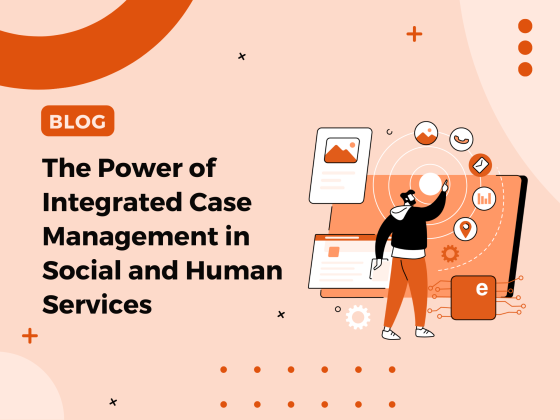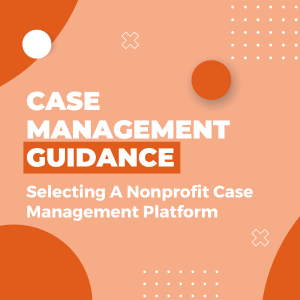The Power of Integrated Case Management in Social and Human Services
Integrated case management is a vital aspect of delivering effective social and human services. It involves a coordinated and comprehensive approach to providing support to individuals and families in need. By integrating various services and resources, case managers are able to address the complex and multi-faceted needs of those they serve, improving outcomes and promoting self-sufficiency. In this blog, we’ll explore the benefits of integrated case management, the challenges it presents, and best practices for delivering this important service. Whether you’re a case manager, social worker, or someone who is interested in the field, this blog is for you! Join us as we delve into the world of integrated case management and discover why it’s essential for promoting positive change in our communities.
What is integrated case management?
Integrated case management is a holistic approach to managing cases that involves coordinating and integrating services across different organizations and sectors. It aims to streamline the delivery of services to clients and ensure that their needs are met in a timely and effective manner. In an integrated case management system, case managers work closely with clients to assess their needs, identify appropriate resources and services, and develop a plan of action. They also collaborate with other service providers, such as social workers, and community organizations to coordinate care and support for clients.
The goal of integrated case management
One of the main goals of integrated case management in social work is to improve the outcomes for clients. By coordinating and integrating services across different organizations and sectors, social workers can help to ensure that clients receive the right support at the right time to meet their needs. This can lead to improved social and economic well-being, and increased independence and autonomy for clients.
There is evidence to suggest that integrated case management can lead to better outcomes for clients in social work settings. For example, research has shown that it can be effective in addressing the needs of vulnerable populations, such as children and families. A study published in the Journal of Children’s Services found that an integrated case management program for families involved with child welfare services resulted in improved outcomes, including increased family stability and reduced risk of child maltreatment. Overall, integrated case management has the potential to make a positive difference in the lives of clients by ensuring that they receive comprehensive, coordinated, and effective support.
What are the benefits of integrated case management?
One of the main benefits of integrated case management is that it helps to ensure that clients receive the right services at the right time, in the right place. This can help to prevent gaps in care and reduce the risk of duplication of service, and ultimately ensure that no client falls through the cracks. It can also help to improve the efficiency and effectiveness of service delivery, as case managers can leverage the expertise and resources of partner organizations to meet the needs of clients.
Another benefit of integrated case management is that it can help to improve the quality of care and support that clients receive. By coordinating services across different sectors, case managers can ensure that clients receive comprehensive and cohesive support that addresses their physical, mental, and social needs. This valuable approach is increasingly being adopted by organizations across various sectors, including healthcare, social services, and community support.
What is the most critical component of integrated case management?
A case management system is a critical component of effective integrated case management. At brass tax, it’s a tool that helps case managers to track and manage client cases, including the assessment of needs, the development of plans of action, and the coordination of services. It can also help to facilitate communication and collaboration between case managers and other service providers.
A case management system can be particularly useful for managing large caseloads and ensuring that clients receive timely and appropriate support. It can also help to improve the efficiency and effectiveness of service delivery by automating many of the administrative tasks involved in case management, such as scheduling appointments and tracking progress. There are many different types of case management systems available, including software solutions that can be customized to meet the specific needs of different organizations and sectors. When selecting a case management system, it is important to consider factors such as the complexity of the cases being managed, the size of the caseload, and the resources and budgets available.
System consolidation that fosters integrated care
Furthermore, if you want to truly be integrated with every aspect of case management, consider an all-in-one platform like Salesforce. Salesforce is a cloud-based constituent relationship management (CRM) platform that offers a range of tools and features for managing and organizing data, automating processes, and collaborating with team members. It can be customized to meet the specific needs of a nonprofit agency and integrated with other systems and applications. The possibilities are endless when you pair this world-class platform with a robust case management platform, such as Exponent Case Management. As a Salesforce-based innovator, we know that including Exponent Case Management on top of your Salesforce instance can improve your integrated case management efforts by providing specialized tools and features for managing and coordinating client cases.
Exponent Case Management is a cloud-based case management app designed to help organizations streamline their case management processes and improve the outcomes for clients. This enterprise case management system supports any program type, any assessment, and any desired outcome. It provides visibility across multiple programs, real-time reporting about your program performance and efficacy, and a 360 degree view of your client’s journey across your agency.
Exponent Case Management offers a range of features for managing and tracking client cases, including:
- Assessment and planning: for conducting assessments of client needs, developing plans of action, and tracking progress towards goals.
- Coordination and collaboration: for coordinating services and collaborating with other service providers, including the ability to create and assign tasks, schedule appointments, and share documents and notes.
- Reporting and analytics: generating reports and analytics, such as client demographics, case trends, and outcomes data. This can help organizations to track and measure the impact of their case management efforts and identify areas for improvement.
For an in-depth look at all the features available, you can access an on-demand recording of an Introduction to Exponent Case Management here.
By adding Exponent Case Management to your Salesforce instance, you can improve your integrated case management efforts by leveraging these specialized tools and features to manage and coordinate client cases more effectively. Furthermore, with Salesforce you can support a variety of agency-wide initiatives such as:
- Volunteer Management: Salesforce can be used to manage and track volunteer information, including contact details, availability, skills, and preferences. It can also be used to schedule and assign volunteers to tasks and events, and to track their progress and impact.
- Donor Management: Salesforce can manage and track donor information, including contact details, donation history, and interests. It can also be used to track fundraising campaigns and measure the impact of donations.
- HR Functions: Salesforce can be used to manage and track HR information, such as employee profiles, performance evaluations, and benefits. It can also be used to automate HR processes, such as onboarding and offboarding, and to facilitate collaboration among HR team members.
Overall, Salesforce and Exponent Case Management can be a powerful platform for supporting integrated case management and enabling a nonprofit agency to manage and coordinate various aspects of its operations more effectively. If you’re interested in learning more about how Salesforce and Exponent Case Management can transform your organization’s approach to case management, we’d love to hear from you. Contact us today to schedule a demo and see for yourself the many benefits of this powerful platform. Whether you’re just starting to explore your options or ready to take the next step, we’re here to help you every step of the way.




